Kumail Nanjiani The Big Sick
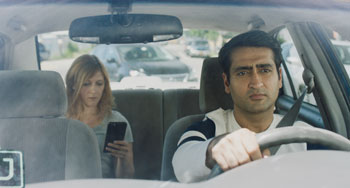
Kumail Nanjiani The Big Sick
Cast: Kumail Nanjiani, Zoe Kazan, Holly Hunter
Director: Michael Showalter
Genre: Comedy, Romance
Rated: M
Running Time: 120 minutes
Synopsis: Based on the real-life courtship between Kumail Nanjiani and Emily V. Gordon, The Big Sick tells the story of Pakistan-born aspiring comedian Kumail (Nanjiani), who connects with grad student Emily (Kazan) after one of his standup sets. However, what they thought would be just a one-night stand blossoms into the real thing, which complicates the life that is expected of Kumail by his traditional Muslimparents.
When Emily is beset with a mystery illness, it forces Kumail to navigate the medical crisis with her parents, Beth and Terry (Holly Hunter and Ray Romano) whom he's never met, while dealing with the emotional tug- of-war between his family and his heart. The Big Sick is directed by Michael Showalter (Hello My Name Is Doris), written by Emily V. Gordon & Kumail Nanjiani, and produced by Judd Apatow (Trainwreck, This Is 40) and Barry Mendel (Trainwreck, TheRoyalTenenbaums).
The Big Sick
Release Date: August 3rd, 2017
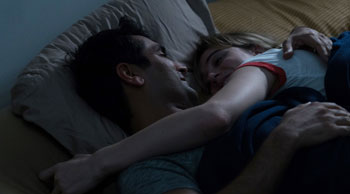 About The Production
About The Production
Incubating The Big Sick
The Big Sick began with a big opportunity for actor and writer Kumail Nanjiani, the kind that only strikes once.
The 90-minute show flew by and as it did, Judd Apatow and Kumail Nanjiani bonded over their various shared interests. Judd Apatow has long made a practice of developing projects with and for comedians, so Kumail Nanjiani didn't take it lightly when Judd Apatow subsequently contacted his manager to propose a meeting.
'I was thrilled of course," Kumail Nanjiani recalls. 'And then I was terrified. Judd and I had gotten along so great at South by Southwest, I thought I could only mess it up from here."
Out of the five ideas Kumail Nanjiani brought to Judd Apatow for that meeting, one story idea he had suggested otherwise – and surprisingly, it was one that came straight from real life: the unlikely story of what unfolded from the day his real-life wife Emily Gordon heckled him during his stand-up set in Chicago to the wild ride that eventually led to their marriage.
Kumail Nanjiani was back a month later to meet with Judd Apatow and producer Barry Mendel – Judd Apatow's collaborator on Funny People, Bridesmaids, This Is 40 and Trainwreck, as well as a two-time Oscar®- nominated producer (The Sixth Sense, Best Picture, 1999; Munich, Best Picture, 2005) of influential films ranging from Wes Anderson's The Royal Tenenbaums and Rushmore to Steven Spielberg's Munich and M.Night Shyamalan's The Sixth Sense - to tell his story.
It was 2006 and Pakistan-born Kumail Nanjiani was living in Chicago, building his career as a stand-up, while Gordon had earned her master's in couples and family counseling and was just starting her career as a therapist. Though neither one was looking to be in a relationship, from the moment they met, they enjoyed being together too much to break it off. Yet things were complicated – largely because Kumail Nanjiani hailed from a conservative Muslim family and his parents expected him to enter into a traditional Pakistani arranged marriage.
Kumail Nanjiani and Emily Gordon dated for a few months, both of them ignoring that dilemma, while Kumail Nanjiani kept promising his parents that he would marry someone they chose. Emily Gordon was still a secret to them when she suddenly became gravely ill in the spring of 2007. Doctors placed her in an induced coma as a life-saving measure while they scrambled to figure out what was wrong.
The experience crystallized everything for Kumail Nanjiani. 'I hadn't been thinking about marriage before Emily Gordon got sick," he says. 'But looking at Emily Gordon when she was put into the coma, I thought to myself, -If she comes out of this, I'm going to marry her.' It was more of the type of thing you feel but don't completely register in all the madness that is going on at the hospital. But there it was." He rode out the crisis alongside Emily Gordon's parents, who came in from North Carolina. After 12 days, doctors successfully diagnosed Emily Gordon and brought her out of the coma. Three months later, Kumail Nanjiani and Emily Gordon were married.
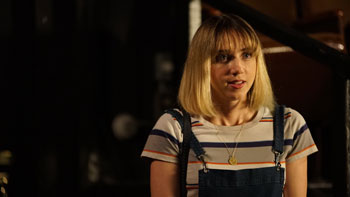 To illustrate his story during his meeting with Judd Apatow and Barry Mendel, Kumail Nanjiani brought along various mementos, including his hospital visitor IDs, that he had saved throughout Emily Gordon's illness. Judd Apatow had never heard anything quite like Kumail Nanjiani's story. 'I thought it was incredible - I've never heard of falling in love with someone while they're in a coma," Judd Apatow describes. 'It was not only true and it was also so heartfelt -- and it was set in the world of stand-up comics, which has always fascinated me."
To illustrate his story during his meeting with Judd Apatow and Barry Mendel, Kumail Nanjiani brought along various mementos, including his hospital visitor IDs, that he had saved throughout Emily Gordon's illness. Judd Apatow had never heard anything quite like Kumail Nanjiani's story. 'I thought it was incredible - I've never heard of falling in love with someone while they're in a coma," Judd Apatow describes. 'It was not only true and it was also so heartfelt -- and it was set in the world of stand-up comics, which has always fascinated me." Barry Mendel, too, was awestruck by the tale. 'Our jaws were just on the floor," he recalls. 'We came out of the meeting and, even though Kumail Nanjiani wasn't a big star yet, Judd Apatow and I both looked at each other and said -this is an incredible story, we've got to do it.' Kumail Nanjiani's story was gut-wrenching and funny and challenging and beautiful, which is everything we all want movies to be that they seldom are. I said I thought we'd be crazy not to throw ourselves into it and Judd Apatow felt the same." With Judd Apatow and Barry Mendel urging him to write, Kumail Nanjiani knew he was facing the challenge of his life. 'I was excited but I was also petrified," he confesses. 'I hadn't really grappled with the emotional experience of her illness yet. But it had been five years and the timing felt right. I think there's a window when you still remember all the feelings and still feel them, but you have enough distance that you can break them down and get some perspective on them. You don't want to wait so long that the feelings go away."
Meanwhile, as he's done since his stand-up years, Kumail Nanjiani asked Emily Gordon to read his work-inprogress. Emily Gordon, a published author and contributor to The Huffington Post, The New York Times, GQ, Lenny and Rookie, gave notes and contributed her own recollection of events. 'I was getting such great notes," he remembers, 'a little bit into the process I said -we should write this together.'"
Emily Gordon was surprised but delighted. 'I honestly had not been thinking about it. But once he said it, I was like, -yeah, that would be pretty cool. I think it would be an amazing experience.' And itwas."
Recalls Barry Mendel: ''We'd gotten a full draft or two from Kumail Nanjiani, and he was great at capturing his own pathos and these really funny situations that occur where you wouldn't think they would, but there was still a dimensionality we all recognised wasn't fully coming through yet. Then Kumail Nanjiani turned in a draft where that self-same dimensionality was suddenly sprouting up all over. We noticed on the cover page that Emily Gordon was now writing with him – and the difference was immediate."
The couple spent three years developing the script in close collaboration with Judd Apatow and Barry Mendel, writing dozens of versions and figuring out how to shape the material. As Emily Gordon explains, 'There were so many ways to go, because there were different angles to the story: a struggling comedian; a guy with a Muslim family living in America; a guy with a sick girlfriend. So there was a lot to circle around."
'We pushed them really hard and there were times we wondered whether they would keep at it," said Barry Mendel, 'but they did. They would do a draft and be all excited about it thinking -OK, now we're really getting somewhere' only to receive an even bigger set of notes than they got from the last draft. And that went on for two full years. But it's not unusual. Often times, making one aspect of the script better only removes the obstacle to seeing where you really need to go."
The couple stayed in broadly autobiographical territory to center the narrative of The Big Sick on Kumail Nanjiani, a native of Pakistan trying to make it as a professional stand-up in Chicago. A world-class compartmentalizer, Kumail Nanjiani scrupulously maintains a line between his dual lives: one as a striving young comic who lives in a crummy apartment and brings home the occasional girl; and another as the adored younger son of observant Muslim parents. His parents try to adjust to his comedy career, in part because Kumail Nanjiani has given them no reason to believe that he won't eventually pursue a more serious one and enter into a traditional Pakistani marriage.
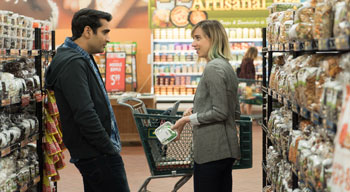 As Kumail Nanjiani sees it, Kumail Nanjiani hasn't yet grappled with the idea that the person he was raised to be in one culture isn't necessarily the person he's becoming in a different culture. Says Kumail Nanjiani, 'The world of Kumail's parents is totally different from the world of Emily Gordon and his comedian friends. He is a totally different person in each of those different worlds - and that's not a good way to live. That became the core of the movie: someone trying to figure out how to be himself."
As Kumail Nanjiani sees it, Kumail Nanjiani hasn't yet grappled with the idea that the person he was raised to be in one culture isn't necessarily the person he's becoming in a different culture. Says Kumail Nanjiani, 'The world of Kumail's parents is totally different from the world of Emily Gordon and his comedian friends. He is a totally different person in each of those different worlds - and that's not a good way to live. That became the core of the movie: someone trying to figure out how to be himself." Meeting Emily Gordon at one of his stand-up shows starts him on that journey. She is studying to be a therapist; she genuinely likes and cares about people - and can read them, too. Kumail Nanjiani describes the two main characters as we first meet them, 'The film's Emily Gordon is smart, strong, very funny and a straight shooter. The Kumail Nanjiani at the beginning of the movie is a child. He is terrified to make any decisions, to put himself out there. He's working really hard to not have to fix the problems in his life."
The progression of their relationship echoes that of their real-life counterparts, who started dating with the intentions of keeping things casual. Says Emily Gordon, 'For the movie, it made sense that they would start off on equal footing in that neither one of them are looking for anything serious, but it kind of happens anyway. I always love it in a movie when people have certain intentions and their emotions get the best of them."
Emily Gordon's initial attempts to not hang out with Kumail Nanjiani romantically have their counterpart in Kumail Nanjiani's 'two-day rule" limiting how much time they can spend together. 'The two-day rule was a real thing," she affirms. 'But I kept noticing that Kumail Nanjiani's actions didn't match his words, but in a good direction. I thought, -this is odd. He's saying things that should be scaring me away but the way he's treating me is not like that at all.'"
Kumail Nanjiani wanted to channel the spirit of his own family in portraying the playful, jokey atmosphere that prevails during Kumail Nanjiani's visits with his parents Azmat and Sharmeen, older brother Naveed and sister-in-law Fatima. 'The dinner scene in the film is exactly how dinners with my family are. There are five different conversations going on, people are talking over each other and everyone's very loud," says Kumail Nanjiani. 'It was important that each relationship be specific and unique, so that it wasn't just one family unit. My relationship with my dad is different from the one with my mom, from the one with my brother etc. We wanted to make sure that audience understood that from the very first dinner scene. That's one scene that stayed pretty much intact through all the rewrites."
It felt good to write what they knew, says Emily Gordon. 'Often in movies and TV, when you see Muslim families they're deadly serious. It's all about -focus on your studies,' things like that. But just because they have expectations doesn't mean you don't have fun with your family. And that's the reality of Kumail Nanjiani's family. They annoy you and they're weird but they're also hilarious and dear."
But it took time for Kumail Nanjiani and Emily Gordon to get their footing in portraying their lives for the screen. Staying true to events exactly as they occurred didn't always suit the larger purpose of making a movie, and the pair also received a lot of good advice along the way from Judd Apatow and Barry Mendel.
'Judd Apatow helped us break out of our experience to construct a story that people would watch and identify with," Kumail Nanjiani explains. 'The idea was to take something that happened and distill it down to its essence. As long as that event feels grounded, you can take it to new places."
Judd Apatow stressed the same principle for the story's characterisations of Beth and Terry Gardner, who rush to Chicago from their home in North Carolina when their only child falls ill. Apart from geography and concern for their child, the Gardners have little in common with Emily Gordon's real-life parents. 'My parents have their quirks but they're basically a lovely, happily married couple who were very focused on their daughter," says Emily Gordon. 'So Judd Apatow said, -here's what you start with.
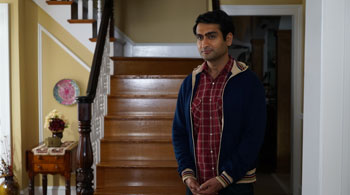 Who are the worst people for this character of Kumail Nanjiani to be stuck in a hospital with for days or weeks? What's the absolute worst version? And then you kind of calibrate it from there.' Which was a really fun idea. We started thinking: what if Kumail Nanjiani, who's not a very open communicator, is stuck with people who are an extreme version of Emily Gordon, always, always wanting to dig into things?"
Who are the worst people for this character of Kumail Nanjiani to be stuck in a hospital with for days or weeks? What's the absolute worst version? And then you kind of calibrate it from there.' Which was a really fun idea. We started thinking: what if Kumail Nanjiani, who's not a very open communicator, is stuck with people who are an extreme version of Emily Gordon, always, always wanting to dig into things?" Writing the second act of the film, when Emily Gordon is in a coma, was an illuminating experience for both Kumail Nanjiani and Emily Gordon. Says Emily Gordon, 'My perspective for a large part of what happens in this movie is nothing, because I was asleep. I had some weird coma dreams, but I wasn't there for a lot of it. I had to learn about what that experience was like for him in a way that I hadn't before. It was really lovely, and kind of amazing, scary and weird. And he never fully understood my perspective, because he couldn't. And I couldn't experience what he went through, either."
Emotionally, their experiences were at opposite ends of the spectrum, Kumail Nanjiani notes. 'When Emily Gordon was in the coma, that was the hardest time for her parents and me. She doesn't remember it. When she was awake, for us that was the happy time. For her it was awful because she was in such pain. Getting that perspective was very helpful in seeing where the character of Emily Gordon would be. Her parents and Kumail Nanjiani think the worst is over, but for her, she's miserable. That disconnect in perspective is a major part of how the movie resolves itself."
From the outset Kumail Nanjiani had some specific ideas about what he wanted to say in The Big Sick. 'At its most basic, I wanted this movie to be about people trying to connect and the things that get in the way of that - generational differences, religion, cultural, whatever it is. And how messy it is just to be person and live in a society and have different beliefs."
Throughout the writing process, it was important to the filmmakers to show both sides of the complicated issues surrounding arranged marriages. Says Kumail Nanjiani, 'So often in movies, the disapproving parents are portrayed as Old World types who don't understand the modern ways or don't believe in love. We didn't want to do that. We wanted the audience to see things from their perspective, which is a compelling one. That felt very three-dimensional. It felt like there are no right answers." Indeed, in the film, Kumail Nanjiani's brother Naveed confesses to Kumail Nanjiani that while he pursued relationships with other women when he was younger, Fatima, his wife via an arranged marriage, has become his best friend and loving partner. For him, the process of not getting to know her beforehand only added to his sense of gratitude and fulfillment that the old way worked.
Kumail Nanjiani had some trepidation when it came to addressing religion, another area where Kumail Nanjiani diverges from his parents. Judd Apatow wouldn't let him off the hook, though. As he recalls, 'Every time we'd hand in a script, Judd Apatow would say, -What about religion?' I'd say, -I don't know Judd Apatow, I don't want to tackle that stuff.' He told me, -You don't have to tackle it. Just talk about how you feel about it. You don't have to have a point to make about religion. You can just say, it's complicated.'" For Barry Mendel, the screenplay digs beneath the surface to what really binds families together, even when religious and cultural taboos are broken.
'We wanted to delve as deeply as possible into the discomfort of beliefs not shared," comments Barry Mendel. 'That is the crux of this family story: which is stronger, love or beliefs? It's easy to say love should be stronger but in practice it's not so simple. Kumail Nanjiani's parents are correct when they call him out on being selfish and misunderstanding the American dream. Usually in these types of stories the parents' POV is -tradition' but that never cuts deep, at least with me. I always ask -yes, but why should we follow the tradition?' Kumail Nanjiani's parents have good answers, and that enriches the story." Watching Kumail Nanjiani find his own strong, original voice was especially exciting. Sums up Barry Mendel: 'It was witnessing somebody in the process of becoming. He became so willing to delve into parts of himself he's not proud of and reveal them in a way that is brave, cool and funny. It became a story where you see someone grow in a very authentic way. It's very intense stuff and the fact that this team was able to make comedy from it is really a testament to Kumail Nanjiani and to the talent of everyone involved. The world feels so divided now and this movie is about people coming together."
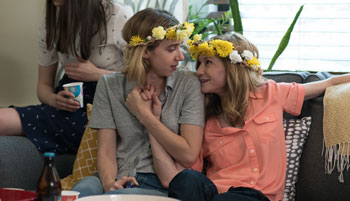 Directing The Big Sick
Directing The Big Sick In the spring of 2015, Judd Apatow and Barry Mendel began sending out The Big Sick screenplay to potential directors. Among those approached was writer/director/actor Michael Showalter (Wet Hot American Summer, 'Stella," 'The State"), who had recently completed the late-life coming-of-age comedy/drama My Name Is Doris. In a serendipitous twist, Showalter and his frequent collaborator Michael Ian Black had given Kumail Nanjiani his first major television job when they hired him as a staff writer and actor for their Comedy Central series 'Michael and Michael Have Issues." He had also cast Kumail Nanjiani in a supporting role in My Name Is Doris.
Although Michael Showalter had become friendly with Kumail Nanjiani and Emily Gordon during the run of 'Michael and Michael Have Issues," he didn't know the history of their relationship. An avowed fan of the romantic comedy, he was taken with both the style and the substance of the screenplay.
'I was riveted by it," Michael Showalter recalls. 'It was such a different way to tell a love story: a romantic comedy that explored all sorts of areas - faith, national identity, culture – all in an incredible true story. Knowing Kumail Nanjiani and Emily Gordon, I felt connected to what I was reading. I could imagine what they were trying to say with the script."
Judd Apatow had followed Michael Showalter's work since the late 1990s and tapped Michael Showalter to direct for his Netflix series 'Love." 'I've been a fan of Michael Showalter's as a creator and performer since -The State' and Wet Hot American Summer," he remarks. 'Then I saw Hello My Name Is Doris and I thought it was incredible. That film was a very difficult balance of comedy and drama and there are so few people who can do that. Kumail Nanjiani and Emily Gordon already knew him. We all thought Mike was the perfect person."
Emily Gordon agrees. 'From the beginning, Michael Showalter had a true sense of the emotional heart of this movie and he championed that," she remarks. 'It was very important to him that we hit the emotions of the movie, that they were being addressed and taken seriously."
Adds Barry Mendel: 'Michael Showalter came in with a lot of big ideas, taking big swings, throwing open the doors to analyzing each character in the script and where they're coming from, what they're doing and why. He stirred it all up … Michael Showalter is also very good at getting the best out of everybody, while having a very laid back approach. He wants to hear everybody's ideas, and he's very good at picking the best of them. When I look at the best directors I've worked with, they all share that quality."
Michael Showalter, Kumail Nanjiani and Emily Gordon began a fresh pass on the screenplay. Michael Showalter notes that the structure of The Big Sick is a major departure for a romantic comedy. 'Usually in a romantic comedy the second act is where the characters fall in love, break up and then they come back together in the third act," he comments. 'In The Big Sick that all happens in the first act. Then something monumental happens at the end of the first act and the love interest is not present for the entire second act - which is challenging as storytelling because how do you keep the love story alive? That was really exciting for someone who loves romantic comedy as I do. To think -can this work?' And to decide: -Yes, this can work if we do it right.'"
The comedy necessarily takes on a darker tone during the second half of the movie, after Emily Gordon becomes sick, but the humor nonetheless remains. Says Michael Showalter, 'Even in the most serious moments of the movie, there's still an undercurrent of humor. Which is the whole way this movie approaches life: no matter how bad a situation gets, you've got to have humor."
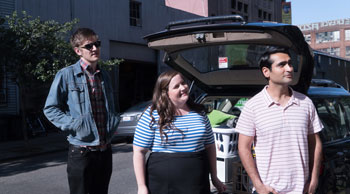 Kumail Nanjiani was gratified that without tipping into sentimentality, Michael Showalter embraced the sweetness at the core of the love story. 'We wanted to make a romantic movie," Kumail Nanjiani says. 'I personally always thought of it as a rom-com. I love rom-coms, and Mike Showalter is a huge rom-com fan too. My favorite movie of all time is Four Weddings & a Funeral. Emily Gordon and I watched it on our wedding day. We had all this specific vocabulary that only we spoke because of our encyclopedic knowledge of rom-coms: -she's a duckface.' We would fully understand each other. Hopefully people agree that it's a romantic movie. I think it is!"
Kumail Nanjiani was gratified that without tipping into sentimentality, Michael Showalter embraced the sweetness at the core of the love story. 'We wanted to make a romantic movie," Kumail Nanjiani says. 'I personally always thought of it as a rom-com. I love rom-coms, and Mike Showalter is a huge rom-com fan too. My favorite movie of all time is Four Weddings & a Funeral. Emily Gordon and I watched it on our wedding day. We had all this specific vocabulary that only we spoke because of our encyclopedic knowledge of rom-coms: -she's a duckface.' We would fully understand each other. Hopefully people agree that it's a romantic movie. I think it is!" After another year and many drafts of script work with Michael Showalter, the team was ready to seek funding for the film. Barry Mendel met with Rena Ronson and her team in the Independent Film Division of United Talent Agency. 'My idea was that we should send the script to all of our top choice buyers at exactly the same time, to the minute. On Friday, November 6, 2015 at 9am, we pushed send and incredibly, by noon, there was a written offer from FilmNation to fund the whole movie, no strings attached. I was amazed, I can't even read a script that fast."
Other buyers approached them over the next few days but they recognised that the combination of such immediate and sincere enthusiasm and FilmNation's track record with films including Top Five, Imitation Game, Nebraska and All Is Lost, they'd found their ideal partner and the deal was quickly closed.
Bring the Family: Casting The Big Sick
Judd Apatow, Barry Mendel, Michael Showalter, Kumail Nanjiani and Emily Gordon starting discussing casting during the rewrites of the summer of 2015. It all came together better than they ever imagined. Says Barry Mendel: 'It is super fun to introduce a new star to the world, and Kumail Nanjiani is a new star – but also Zoe Kazan is a new romantic heroine, people have never seen Ray Romano like this, and Holly Hunter is giving a performance as good as she has ever given before. It's just a thrill to present these actors in this story to the world."
At the top of the filmmakers' list for the role of Emily Gardner was Zoe Kazan. They were thrilled that Zoe Kazan, an acclaimed playwright herself, was eager to audition.
'I was so taken with the script and the story," she comments. 'The Big Sick was not like other things I'd read. I was very impressed by the deftness of tone Kumail Nanjiani and Emily Gordon achieved - it's emotional, funny and scary all at the same time. I looked at videos of Kumail Nanjiani and Emily Gordon online and felt that I understood who they were. And when I auditioned, I loved the feeling in the room. There was a strong feeling of people wanting to go to work."
Emily Gordon wasn't present for Zoe Kazan's audition, but watched a tape later. 'From the moment the tape started, it was obvious that Zoe Kazan was the girl. There was not even a question," Emilyt Gordon comments. 'There's a real depth to Zoe Kazan, an intelligence and passion. But she also has a lightness and humor. She's not a self-serious human. I was very excited she decided to do it." Zoe Kazan, Emily Gordon and Kumail Nanjiani spent a couple of weeks together to bring the character further into focus.
Explains Kumail Nanjiani, 'We wanted Zoe Kazan to get to know the real Emily Gordon, and Emily and I wanted to get to know Zoe Kazan so we could write in her voice," explains Kumail Nanjiani. 'Working together for a couple of weeks helped us see where her character would go and how she would react in different situations. A lot of scenes were rewritten based on improvs that Zoe Kazan and I did."
It was during those rehearsals that the filmmakers decided to make Emily Gordon's brief first marriage a part of the film. Zoe Kazan and Kumail Nanjiani began improvising and a scene was written. Comments Kumail Nanjiani, 'The first marriage was an important part of my character's back story because it made her both more willing to give her heart, having known the heights and depths of love before; and it also made her more wary of Kumail Nanjiani once he breaks her trust."
Zoe Kazan honed in on exactly the right mix of straight up emotion and comic edge. 'I always saw Emily Gordon as a woman who takes herself seriously." Michael Showalter remarks. 'In order for us to take her seriously, she needed to take herself seriously. I didn't see her as being cute or dorky; she's serious about the things she cares about, which is not the cookie cutter romantic comedy lead woman. Zoe Kazan is very funny but she also exudes such intelligence and depth, that she really fits the character."
Once shooting began, that only became clearer. 'To me," says Barry Mendel, 'the most memorable moment of this movie was watching Zoe Kazan break up with Kumail Nanjiani. It was riveting cinema, she took the acting level to a transcendent level."
Although Kumail Nanjiani playing himself, the challenges were myriad, and this would also mark his first lead role in a movie, though he is now known to millions of television viewers of the acclaimed HBO hit comedy 'Silicon Valley."
Says Judd Apatow, 'When we started talking about this movie, Kumail Nanjiani was just known as a fantastic comedian. His career has evolved so much while we've been developing this project. It's exciting because I think people really want to see him as the lead in a movie."
Barry Mendel calls Kumail Nanjiani 'uncategorisable" and likens him to other one-of-a-kind comedians, including Kristen Wiig, Melissa McCarthy and Amy Schumer, he has watched turn into movie stars in films he's produced. 'They're each such different people but what I think they have in common is that they know themselves very well," he observes. 'They're not trying to fit into other people's conceptions of who they ought to be. I think Kumail Nanjiani will have a very interesting career. He's so smart and curious about the world that as a moviegoer, I can't wait to see what he does next."
Next came the challenge of casting Emily Gordon's parents. It's the unlikely bond that forms between Kumail Nanjiani and Emily Gorfon's parents that drives the middle section of the film and although there had been significant rewrites for the characters of Beth and Terry, it wasn't until Oscar® winner Holly Hunter and Emmy® winner Ray Romano signed on that their characters truly came into focus. 'Zoe Kazan, Holly Hunter, Ray Romano - these were the people we dreamed would say -yes,'" says Judd Apatow. 'Ray Romano and Holly Hunter are two of my all-time favorites. -Everybody Loves Raymond' is a miracle of a show. It was so funny, so consistently. Holly Hunter has been in many of my favorite movies of all times. I think everything I've ever done has been a failed attempt to make something as good as Broadcast News."
The chemistry was immediately apparent at the first table read with Kumail Nanjiani, Zoe Kazan, Holly Hunter and Ray Romano, which paved the way for further refinement of the script and the characters' interpersonal dynamics. 'As actors: Kumail Nanjiani, Holly Hunter, Zoe Kazan and Ray Romano all portray life as it really is – a complicated, emotional tangle of humor, sadness, anger and love," said Michael Showalter. 'While they are unique and distinct they also blend together wonderfully as an ensemble."
Adds Barry Mendel, 'We were very lucky to get the actors we did. We also invited Vella Lovell to read the part of the Kumail Nanjiani's Pakistani marriage prospect he might have ended up with , after which it was hard to imagine anyone else."
Holly Hunter was intrigued by the way The Big Sick wove together its disparate elements. 'I thought the shape and texture of the movie was really unusual and wonderful," she remarks. 'It's once removed from doing a documentary, which makes it much more interesting. Taking such a serious matter and making it playful - that's surprising. You have the female lead of the movie and she's in a coma. It goes places that typical movies don't go."
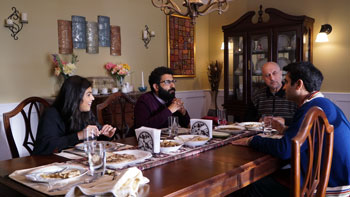 She was also struck by the emotional evolution of the Kumail Nanjiani character. 'I think that Kumail Nanjiani grapples with his own honesty in the course of this movie," Holly Hunter reflects. 'I'm attracted to stories about people who are playing catch-up with themselves. That's what this movie is about: a guy who makes an extremely unlikely, inconvenient connection with another person and his life has to catch up with that connection. But he's willing to play catch-up, he's willing to do the terrifying work to catch up with himself so that he can live an authentic life."
She was also struck by the emotional evolution of the Kumail Nanjiani character. 'I think that Kumail Nanjiani grapples with his own honesty in the course of this movie," Holly Hunter reflects. 'I'm attracted to stories about people who are playing catch-up with themselves. That's what this movie is about: a guy who makes an extremely unlikely, inconvenient connection with another person and his life has to catch up with that connection. But he's willing to play catch-up, he's willing to do the terrifying work to catch up with himself so that he can live an authentic life." Barry Mendel says Holly Hunter was galvanizing in the role. 'She is a force of nature," he observes, 'not just because of the power of her presence, but because she goes after something so honest." Ray Romano and Judd Apatow first met in 1992, when both were featured on MTV's Young Comedians Special. He would later seek him out for a cameo role in his third directorial feature Funny People.
'Judd Apatow and I knew each other but we weren't buddies, we didn't come up in the same circuit," Ray Romano says. 'I knew he respected me and I respected him. So it was nice when he asked me to do a cameo in Funny People. Getting asked to play Terry was unexpected but wonderful."
Beth and Terry are opposites in temperament; he's methodical and easy-going, she's unfiltered and feisty. Yet their marriage has lasted 30 years, something Romano could relate to his own experience. 'I've been married 28 years and my wife is very real and truthful, which is how Beth is," he comments. 'I think Beth appreciates Terry because he's not trying to be anything he's not. In his geeky way, he's very real. They're totally different but sometimes that's why it works." Emily Gordon was delighted as she watched Romano and Hunter bring defining traits to their characters.
'Once we cast Ray Romano and Holly Hunter, everything started clicking into place," she recalls. 'Holly Hunter brings a different energy than my actual mother. Her Beth is all heart. You see all of her emotions; she doesn't see any need to hide or shelter them. Ray Romano came up with all these really bad dad jokes and he kept doing them in the movie as runners and it killed me. It was such a perfect dad thing to do. There are few scenes where you see a crack in his stoic, I'm-gonna-tell-jokes-to-distract approach, where you see how this has shaken him to his core. He was astounding."
For Kumail Nanjiani, there was a sense of purpose in approaching veteran Indian actor Anupam Kher to play the role of Kumail's father, Azmat. Kher is a Bollywood legend whose career spans some four decades and 500 films, including acclaimed hits Silver Linings Playbook and Bend It Like Beckham.
'I've been a fan of Anupam my whole life," Kumail Nanjiani says. 'I had asked my real-life dad who he wanted to play him. He said -Anupam Kher.' I said -Perfect. My first choice too.' From then on, I only ever saw Anupam in the role and we pretty much wrote it for him. But he found such specificity in the role and brought so many ideas about how our particular relationship worked."
Recalls Barry Mendel: 'We got in touch with Anupam's manager in Bombay, sent a script, and I think the reaction was -maybe.' But then Anupam sent us a bunch of very good ideas that could enhance his character - so it was really a kind of conversation that lead to Anupam doing the movie. And it was super flattering to us, because Anupam has done hundreds of films. So the only reason he would want to come all the way from Bombay to do this little movie is because he loved it."
Anupam Kher says that he was drawn first to working with Apatow. 'I was very excited to be working with Judd Apatow because most of his films have a sense of soul in them, and he doesn't take himself too seriously. There's an ease about his films."
Kumail Nanjiani's per
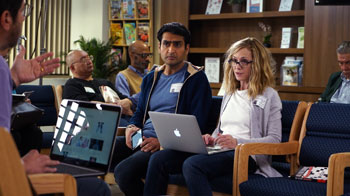 sonal desire to have him take the role also moved him. 'The fact that Kumail Nanjiani called me straightaway about the role and said it was his father's wish that I do this, that connected with me on a very emotional level. I also like human stories and the fact that it was based on Kumail Nanjiani and Emily Gordon's life was very amusing. It was important for me, this film, because it was going to be my 500th film. I wanted it to be a great experience and it worked out very well," Anupam Kher elaborates. With his vast amount of cinematic experience, Anupam Kher brought his own touches to the character.
sonal desire to have him take the role also moved him. 'The fact that Kumail Nanjiani called me straightaway about the role and said it was his father's wish that I do this, that connected with me on a very emotional level. I also like human stories and the fact that it was based on Kumail Nanjiani and Emily Gordon's life was very amusing. It was important for me, this film, because it was going to be my 500th film. I wanted it to be a great experience and it worked out very well," Anupam Kher elaborates. With his vast amount of cinematic experience, Anupam Kher brought his own touches to the character. 'Azmat has an undercurrent of comedy even though he's very real," he observes. 'I did some of my own work on Azmat's backstory - where he was born, was his first job, how did he raise his two sons, his desire to be important in somebody's life," he explains. 'There's a very beautiful line when he talks about the American dream. Azmat rejects that the American dream is doing whatever you want and not thinking about other people. To him, it's the opposite. Being a good son, husband and father is the dream."
Also portraying members of Kumail Nanjiani's family are Adeel Akhtar as his older brother Naveed; Zenobia Shroff as his mother Sharmeen; and Shenaz Treasurywala as Naveen's wife, Fatima. 'I'd seen Adeel on stage opposite Jim Broadbent in London," said Barry Mendel, 'and then one day, a tape arrived in our mailbox and he was putting himself up for the part. We all knew Four Lions and felt so lucky to have him. He's a very gifted and natural actor."
Part of creating an authentic portrait of the standup comedy world involved casting real comedians who would be able to build on one another's jokes. Casting Kumail Nanjiani's actual friends Aidy Bryant, Bo Burnham and Kurt Braunohler as Kumail's buddies Mary, CJ and Chris allowed the actors to build on their pre-existing relationships. The trio brought depth as well as hilarity. 'Kumail Nanjiani, Chris, Mary and CJ are written as the four friends who hang out together," says Kumail Nanjiani.
'It was so cool in the shooting to see how they all have different relationships with each other. There's a sweetness to their friendship that I didn't necessarily see when Emily and I wrote the script but it was there when we shot. Aidy, Bo and Kurt elevated that whole part of the movie."
Coming To Fruition: Production Begins
The Big Sick began production on May 11, 2016 in New York City. The collaborative approach that marked the film's development continued as filming got underway.
Rehearsals often led to rewrites, which led to additional work for Kumail Nanjiani and Emily Gordon. It was work they were happy to do, says Kumail Nanjiani. 'That was a very gratifying and exciting part of the process, the seemingly never- ending rewriting. I felt that every rewrite we did made the script better in some small way or some big way. You hear horror stories about executives getting involved and ruining scripts but we felt very protected. All the different voices understood the movie we wanted to make, got the tone, got the story, got what we wanted to say. So everybody's opinion was very valuable." Hunter credits the filmmakers for the open and creative environment on set. 'Mike Showalter, Judd Apatow and Barry Mendel trusted they had the right people playing these parts," she remarks.
'That meant that our instincts were bona fide. That's great and that's rare. We would do different takes, try different things. It was like the movie was a big cauldron and everybody took turns stirring it." Holly Hunter considered every detail when rehearsing a scene; not only lines, but also props –the blankets Beth brings for her daughter's bed are from Holly Hunter's own home – and blocking.
Kumail Nanjiani remembers watching Holly Hunter map out each beat of a key hospital scene that lays bare some of the tensions between Beth and Terry as they confront the gravity of their daughter's situation. 'Holly Hunter choreographed every movement," he says. '-All right, we'll go here for this, then we'll go around the corner for this, then I'll try to get the phone from my purse…' I realised she was adding obstacles so her character can get angry. She rehearsed it over and over, maybe 15 times. When we shot it she did 10 takes in a row, each one different, each one perfect."
As Holly Hunter and Ray Romano rehearsed their scenes together, the relationship between their characters developed the patina of shared history and mutual knowledge. This affected how Ray Romano approached certain scenes, including the scene where Terry sleeps over at Kumail Nanjiani's apartment. During the table read, that scene played as pure comedy. Then on the day the scene was filmed, it was thrilling to see Ray find deeper emotional layers to the scene. 'Ray Romano is such a wonderful naturalistic actor," said Michael Showalter, 'He is fully committed to the internal motives of a scene. The result can be something hysterically funny or dramatic and cathartic. No matter what it's always completely coming from a place of emotional honesty."
Holly Hunter was just as impressed with Ray Romano. 'Ray Romano's got a great analytical mind. He knows what feels authentic and he knows when something doesn't make intuitive sense," she comments. 'I loved his sensibility and it brought a real integrity to the movie and our relationship. I didn't know that would happen. It was wonderful that he could bring that essential ingredient to the collaboration." For his part, Ray Romano allows that he was somewhat nervous about acting opposite Holly Hunter, easily one of the most acclaimed and admired actresses on the planet. But she quickly put him at ease.
'Holly Hunter's collaborative and inclusive. I never felt scared to pitch an idea, she always wanted to hear. She wants you to feel good. You feel good that she cares so much about the story. It's not just about her," he says.
Kazan felt a deep sense of responsibility towards the true story at the heart of The Big Sick. 'Emily Gordon and Kumail Nanjiani were very brave in putting themselves on the page - and also generous in that they were giving a lot of their humor and a lot of their personal stories to this movie. They're really making art out of their lives. In that spirit, I felt that the script was challenging me to bring as much of myself to the table as possible. Unlike some of the other parts I've played, this role wasn't about transformation. It required me to drop into my real self and use my real personality and use my emotions and have an easiness with myself in thepart."
While The Big Sick is a romantic comedy, Zoe Kazan's character experiences intense emotional and physical upheavals over the course of the film. In the first act, we watch her fall in love, only to get her heart broken; in the third act, she has to grapple with the ramifications of her health crisis and its effect on her and the people around her. Her colleagues were struck by the seamlessness of her craft during these demanding scenes.
'There's an emotional credibility and gravity Zoe Kazan brings which is rare," says Barry Mendel. 'In the big scenes, she just plain brings it." Adds Michael Showalter, 'We truly feel we've gotten to know "Emily" in the short time we have with her in Act One."
The production faced a crisis of its own when a visa snafu delayed the arrival of Anupam Kher, the Bombay- based star who plays Kumail Nanjiani's father. Extra time had been set aside to rehearse and film the Nanjiani family scenes, but by the time the visa issue was resolved, there were just three days to film all of the family scenes. It's a testament to the actors and director Showalter that with no time to rehearse, Nanjiani, Kher, Akhtar, Shroff and Treasurywala were able to conjure the lived-in feel of a realfamily.
The filmmakers were just as committed to verisimilitude when it came to depicting the backstage life of Kumail Nanjiani and his fellow comedians, with its singular mixture of razzing, competition and supportiveness. Notes comedian Kurt Braunohler: 'We shot the backstage scenes at the actual venue where I hosted a weekly comedy show for two years with comedians who had done that show. You really can't get any closer to what it's really like to be backstage with a bunch of comedians. Everyone's doing bits, making fun of each other, admiring Bo's hair. It's just amazingly thick."
Bo Burnham praises Michael Showalter's collaborative directing style, 'Michael Showalter was always off camera throwing us lines and making all of us laugh," he recalls. 'He was the funniest one there, which is great. He felt like one of the group - like we were improvising with him too."
Kumail Nanjiani's camaraderie with his comedian friends goes beyond riffing jokes. Kumail Nanjiani turns to them as he tries to handle Emily Gordon's sudden illness. 'Most people in the comedy community are very supportive," notes Aid
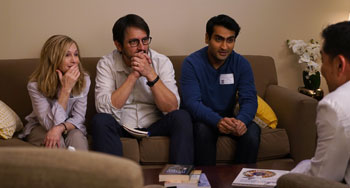 y Bryant, 'but they also know that it just feels good to blow off steam or look on the lighter side of a tough thing. I feel like so often when people have sad experiences it feels so good to come back to your comedy friends and be like, -this insane thing happened to me,' and it feels good to laugh about that stuff. So I think that element of the film is pretty true to life."
y Bryant, 'but they also know that it just feels good to blow off steam or look on the lighter side of a tough thing. I feel like so often when people have sad experiences it feels so good to come back to your comedy friends and be like, -this insane thing happened to me,' and it feels good to laugh about that stuff. So I think that element of the film is pretty true to life." Sums up Barry Mendel of the production: 'This movie was the ultimate lesson in how it takes a village to raise a child. There were so many people whose contributions mattered, and it wasn't just one person's voice driving through the film. Without many people bringing their absolute best work to the table, the film wouldn't have been what it is. When you care about something on a deep level and you connect to it emotionally, that inspires the work to be even better."
Photographing and Scoring The Big Sick
Behind the camera, the commitment to the authenticity and emotional richness was just as strong as it in front of it. Director of photography Brian Burgoyne – who had collaborated with Michael Showalter on Hello My Name Is Doris and impressed Michael Showalter, Judd Apatow and Barry Mendel with his work on Other People– came aboard ready to bring a very natural visual ambience to the comedy. Notes Michael Showalter, 'Brian's cinematography is very intuitive and soulful. There's an intimacy and a warmth to it. He's sympathetic to the world he's photographing. He's inside it."
Composer Mike Andrews was a late addition to the post-production team. Mike Andrews' collaboration with Judd Apatow dates back to 'Freaks and Geeks" and includes 'Undeclared," Funny People and Bridesmaids. He was immediately impressed by the execution of the story. 'When I first got the movie," he recalls, 'it was mostly locked and I watched it all the way through without any music. I was really touched by the honesty of the performances and the subtlety of the comedy." Mike Andrew felt great clarity about where he wanted to take the music. 'I always try to walk hand-inhand with the movie, shading, supporting and celebrating what is great and original about it," he says.
'Michael Showalter very clearly mapped the movie out emotionally for me and we stuck to the idea that it is basically a romantic comedy until we reach the moment of sickness. As Zoe Kumail begins the second part of his journey, I saw him as being in a bit of a fog and suspended state until his reaches a more grounded clarity, so the music follows that intent. Simultaneously Zoe Kumail's relationship with the Emily Gordon's parents needed its own feeling and trajectory, allowing us to feel the growth of friendship and understanding while allowing the movie to breathe comedically."
Mike Andrews describes the evolution of the film's score: 'Originally there was talk of trying to integrate Eastern elements into the score. Because this movie deals with the conflicts of culture clashes and assimilation, bringing in elements of music from India and Pakistan seemed appropriate. But I tried it and mostly it felt forced. Strangely, once we stripped some of the pieces of these Indian elements, the score felt right. A couple of the tabla pieces did remain and I suppose they are the ghosts of the combination of the twostyles."
Another key design touch – to include photos of the real Kumail Nanjiani and Emily Gordon - was an idea of actress Leslie Mann who had seen an early cut of the film with her husband, Judd Apatow. Kumail Nanjiani and Emily Goron's story seems to fade to black on a hopeful note for their relationship but without clarifying if and how Kumail Nanjiani's relationship with his family and their opposition to his relationship resolved. 'We wanted to show what happened in real life, that Kumail Nanjiani's family came to accept and embrace Emily Gordon as part of their family," said Barry Mendel, 'and that is how the story ends."
After finishing the film, Judd Apatow praised Kumail Nanjiani and Emily Gordon's commitment to getting it right. 'It was a very open process," he states. 'Kumail and Emily were very flexible and crazy hard-working. It takes some courage to go deep and think about all your feelings and how you relate to the story and to your significant other and to your parents. Without a lot of courage you can't really make a movie like this."
For all of the sweat and tears that went into bringing it to the screen, Barry Mendel notes that what makes The Big Sick so potent is that it comes from an authentic experience. 'The movie is filled with things from real life that no writer would ever think if it hadn't actually happened to him," he concludes, 'and I think that's what makes the movie such a special experience."
The Big Sick
Release Date: August 3rd, 2017
MORE
- Mission: Impossible Fallout
- Glenn Close The Wife
- Allison Chhorn Stanley's Mouth Interview
- Benicio Del Toro Sicario: Day of the Soldado
- Dame Judi Dench Tea With The Dames
- Sandra Bullock Ocean's 8
- Chris Pratt Jurassic World: Fallen Kingdom
- Claudia Sangiorgi Dalimore and Michelle Grace...
- Rachel McAdams Disobedience Interview
- Sebastián Lelio and Alessandro Nivola...
- Perri Cummings Trench Interview



